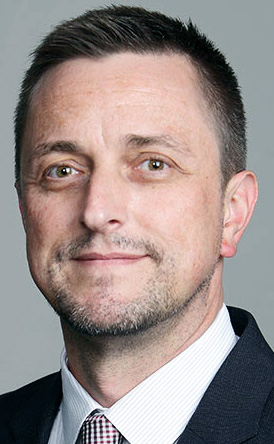

 I just saw another article yesterday written by a major-city newspaper telling the public that 5G is coming in 2020. I hate to see reporters who have accepted the nonsense being peddled by the carriers without digging a little deeper to find the truth. At some point in the near future, the public will finally realize that the 5G talk has mostly been hype. more
I just saw another article yesterday written by a major-city newspaper telling the public that 5G is coming in 2020. I hate to see reporters who have accepted the nonsense being peddled by the carriers without digging a little deeper to find the truth. At some point in the near future, the public will finally realize that the 5G talk has mostly been hype. more
 For close to 15 years, when it comes to domain name management, I've personally touted two things: 1) the importance of using a single, secure, corporate domain name registrar and 2) the importance of having a fully-consolidated domain name portfolio for even the largest portfolios. And in many ways, this made sense back then. With a single, corporate-focused registrar, domain professionals were able to access and manage all domains from within a centralized repository. more
For close to 15 years, when it comes to domain name management, I've personally touted two things: 1) the importance of using a single, secure, corporate domain name registrar and 2) the importance of having a fully-consolidated domain name portfolio for even the largest portfolios. And in many ways, this made sense back then. With a single, corporate-focused registrar, domain professionals were able to access and manage all domains from within a centralized repository. more
 Dotzon presents the results of their "Digital City Brands 2019" study. In the third edition of "Digital City Brands" after 2017 and 2018, Dotzon analyzed which factors determine the successful use of Digital City Brands. The Digital City Brand is the digital dimension of the City Brand and mirrors the "Digitalness" of a city. European capitals like Berlin, Paris and London were among the first to have their own Digital City Brands. more
Dotzon presents the results of their "Digital City Brands 2019" study. In the third edition of "Digital City Brands" after 2017 and 2018, Dotzon analyzed which factors determine the successful use of Digital City Brands. The Digital City Brand is the digital dimension of the City Brand and mirrors the "Digitalness" of a city. European capitals like Berlin, Paris and London were among the first to have their own Digital City Brands. more
 Over the past 30 months, since Trump was installed in the White House, he has systematically abrogated US treaty responsibilities and diminished the nation's engagement in international collaborative activities. More recently, his gambits have expanded to market entry, chip component, and software restrictions on Chinese telecommunication equipment vendors, especially Huawei. more
Over the past 30 months, since Trump was installed in the White House, he has systematically abrogated US treaty responsibilities and diminished the nation's engagement in international collaborative activities. More recently, his gambits have expanded to market entry, chip component, and software restrictions on Chinese telecommunication equipment vendors, especially Huawei. more
So you're still lost, wondering where to start and what to do to submit your application in the next round of new top-level domain application? Well, you can attend webinars and listen to service providers telling you what you have to do with them "to be prepared"... but please... pay no one for this. Here is why. There are two things to know and one thing to do first. more
 This past Monday, as ICANN65 was beginning in Marrakesh, the technical review blog Review Signal published a detailed expose, "The Case for Regulatory Capture of ICANN" authored by site founder and "geek-in-charge" Kevin Ohashi. The post was clearly the product of extensive investigative reporting – and what it reveals is deeply disturbing. more
This past Monday, as ICANN65 was beginning in Marrakesh, the technical review blog Review Signal published a detailed expose, "The Case for Regulatory Capture of ICANN" authored by site founder and "geek-in-charge" Kevin Ohashi. The post was clearly the product of extensive investigative reporting – and what it reveals is deeply disturbing. more
 Economists at the University of Tennessee at Chattanooga and Oklahoma State University conducted a study that correlates broadband speeds to unemployment. They concluded that unemployment rates are 0.26% lower in counties with faster broadband. They further concluded that broadband has a bigger impact on jobs in rural areas than in metropolitan ones. more
Economists at the University of Tennessee at Chattanooga and Oklahoma State University conducted a study that correlates broadband speeds to unemployment. They concluded that unemployment rates are 0.26% lower in counties with faster broadband. They further concluded that broadband has a bigger impact on jobs in rural areas than in metropolitan ones. more
 In our globalized economy, it is vital that we do establish levels of fair trade, and the USA is right in addressing that issue. However, making technology a key element of the trade war will backfire. Let's take (again) the Huawei issue as an example. The company has admitted that the US boycott is hitting them severely with an estimated loss of $30 billion in revenues. One of the other elements of the trade boycott is that Google is no longer allowed to provide... more
In our globalized economy, it is vital that we do establish levels of fair trade, and the USA is right in addressing that issue. However, making technology a key element of the trade war will backfire. Let's take (again) the Huawei issue as an example. The company has admitted that the US boycott is hitting them severely with an estimated loss of $30 billion in revenues. One of the other elements of the trade boycott is that Google is no longer allowed to provide... more
 The Internet has provided an unprecedented number of opportunities while raising far-reaching legal issues. It has created a complex matrix of national laws, global circumstances and new definitions -- or, at least, definitions in progress. The turmoil over Brexit and the international implications of the EU General Data Protection Regulation are signs of the times; as are issues surrounding domain names. more
The Internet has provided an unprecedented number of opportunities while raising far-reaching legal issues. It has created a complex matrix of national laws, global circumstances and new definitions -- or, at least, definitions in progress. The turmoil over Brexit and the international implications of the EU General Data Protection Regulation are signs of the times; as are issues surrounding domain names. more
 Amazon announced that they would be providing satellite ground station service last year and Andy Jassy, CEO of Amazon Web services, announced its availability in the video at the end of this post. AWS Ground Station is a fully managed, ready-to-go ground station service... This sounds like a compelling case, especially for a small operator or startup, but I don't know how the prices compare to existing services or building proprietary ground stations. more
Amazon announced that they would be providing satellite ground station service last year and Andy Jassy, CEO of Amazon Web services, announced its availability in the video at the end of this post. AWS Ground Station is a fully managed, ready-to-go ground station service... This sounds like a compelling case, especially for a small operator or startup, but I don't know how the prices compare to existing services or building proprietary ground stations. more
 The international community is converging on one notion at least: that Facebook cannot be prosecutor, judge and jury of its own achievements and transgressions. The calls to regulate social media companies first came from various legislative bodies, then from civil society and national policymakers, then from the CEO of Facebook itself, "to preserve what is best about [the Internet]." If some scepticism followed that was natural enough – was the company sincere in calling for more regulation? more
The international community is converging on one notion at least: that Facebook cannot be prosecutor, judge and jury of its own achievements and transgressions. The calls to regulate social media companies first came from various legislative bodies, then from civil society and national policymakers, then from the CEO of Facebook itself, "to preserve what is best about [the Internet]." If some scepticism followed that was natural enough – was the company sincere in calling for more regulation? more
 In a trademark context, who owns or controls, or would prevent others, from using words and phrases commonly available to speakers in a language community, is in persistent tension. While common words alone or combined may become protected from infringing uses under trademark law, their protection is contingent on factors such as linguistic choices and strength or weakness of marks in the marketplace. more
In a trademark context, who owns or controls, or would prevent others, from using words and phrases commonly available to speakers in a language community, is in persistent tension. While common words alone or combined may become protected from infringing uses under trademark law, their protection is contingent on factors such as linguistic choices and strength or weakness of marks in the marketplace. more
 For those of us in the domain name industry, it's clear that security threats and the way we track, report, and mitigate them has been a topic of increased discussion and focus in recent months. As we prepare to come together as a community again at the next ICANN public meeting in Marrakech, many of us will look to continue these conversations, as there is no doubt it is a topic of importance, relevance and urgency for our community at this time. more
For those of us in the domain name industry, it's clear that security threats and the way we track, report, and mitigate them has been a topic of increased discussion and focus in recent months. As we prepare to come together as a community again at the next ICANN public meeting in Marrakech, many of us will look to continue these conversations, as there is no doubt it is a topic of importance, relevance and urgency for our community at this time. more
 Facebook has announced its Libra cryptocurrency. This is good news for cryptocurrencies and market-incentivized networks. I worry that Libra's financial inclusion might come with an attendent loss of privacy or autonomy. After months of speculation, Facebook on Tuesday announced Libra, a cryptocurrency with the mission of enabling a simple global currency and financial infrastructure that empowers billions of people. more
Facebook has announced its Libra cryptocurrency. This is good news for cryptocurrencies and market-incentivized networks. I worry that Libra's financial inclusion might come with an attendent loss of privacy or autonomy. After months of speculation, Facebook on Tuesday announced Libra, a cryptocurrency with the mission of enabling a simple global currency and financial infrastructure that empowers billions of people. more
 Compared to Miami, Havana is an Internet desert, but Havana may have 5G wireless connectivity before Miami. 5G architecture, US politics and policy, and the 5G timetable favor Havana. Let's start with 5G architecture. 5G will require many "small cells" because it uses high-frequency radio signals that don't travel as far as 4G signals and are more easily blocked by obstructions like trees and buildings. more
Compared to Miami, Havana is an Internet desert, but Havana may have 5G wireless connectivity before Miami. 5G architecture, US politics and policy, and the 5G timetable favor Havana. Let's start with 5G architecture. 5G will require many "small cells" because it uses high-frequency radio signals that don't travel as far as 4G signals and are more easily blocked by obstructions like trees and buildings. more
Sponsored byVerisign

Sponsored byVerisign

Sponsored byCSC

Sponsored byDNIB.com

Sponsored byIPv4.Global

Sponsored byWhoisXML API

Sponsored byRadix
